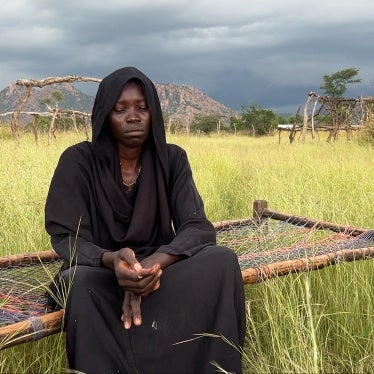Hon. Bire Kimisopa
Minister for Internal Security
VIA FACSIMILE
Dear Minister Kimisopa:
We have noted recent reports of your announcement that, after a recruitment freeze of at least four years, the Royal Papua New Guinea Constabulary (RPNGC) intends to recruit 230 new members. Amnesty International, Human Rights Watch and MERI I KIRAP SAPOTIM believe that a vital step towards creating a police force that enjoys the support of the wider community is to ensure that the composition of police reflects all sectors of the community, including women. We therefore write to urge you to use this new recruitment drive to increase the representation of women in the force, and to give effect to the recommendation of the September 2004 Report of the Royal Papua New Guinea Constabulary Administrative Review Committee that the recruitment of female officers be “further encouraged and enhanced.” At present, although the National Goals and Directive Principles contained in the Constitution call for equal participation of women in all aspects of the life of the country, women make up as little as 6 percent of the RPNGC.
As you are aware, the RPNGC has a poor record of assisting women and girls who report incidents of violence, and of respecting the rights of women and girls in custody. Our organisations have documented numerous accounts of police officers ignoring and turning away women and girls who attempt to report incidents of gender-based violence, including rape and violence within the family. We have also received reports of members of the RPNGC requesting sexual favours as a pre-requisite to investigating crimes reported to them. Further, we have collected extensive evidence of members of the RPNGC subjecting women and girls in custody to rape and other forms of cruel, inhumane and degrading treatment.
We welcome your public condemnation last year of such abuses, and your acknowledgment that they have eroded women’s respect for and confidence in the police force. Of course, the first step towards eradicating human rights violations committed by police against women is to bring perpetrators to justice. However, in addition, we believe that ensuring increased numbers of female police officers is also an important step towards meeting Papua New Guinea’s obligations to protect women and girls from gender-based violence perpetrated both by state agents, including the police, and private actors alike.
According to international human rights standards, including the U.N. Standard Minimum Rules for the Treatment of Prisoners and the Human Rights Committee’s interpretation of the International Covenant
on Civil and Political Rights, female staff should be present during the interrogation of female detainees, and should be solely responsible for carrying out any body searches of female detainees. There should be no contact between male guards and female detainees without the presence of a female guard. However, without adequate numbers of female police officers, compliance with these standards cannot be guaranteed and the risk to female detainees of rape and other forms of gender-based violence is subsequently increased.
Further, according to international human rights standards, the state should take necessary steps to ensure that women are treated respectfully and professionally by police dealing with their complaints and are not deterred from reporting incidents of gender-based violence. Community-based organisations that work with women in Papua New Guinea have reported that the lack of female police officers on duty deters women and girls from reporting incidents of gender-based violence. Although many police stations in Papua New Guinea have a policy of providing female victims of gender-based violence with the option to be heard by a female officer, our research has discovered that in practice there are often no female officers available to receive information and take statements from female complainants.
Of course, increasing the number of female police officers will not, in itself, transform the human rights record of the RPNGC. Other important measures which must be adopted include providing training to sensitize all police officers to the needs of women, allowing ongoing, independent human rights monitoring of police, holding accountable, both through disciplinary measures and through criminal prosecution, any officers found to have committed human rights violations and ensuring that supervisors throughout the chain-of-command are held responsible for their subordinates' adherence to the Commissioner’s Directives, Regulations and Standing Orders and take appropriate action against any who violate them. Nonetheless, this new round of recruitment offers an opportunity to move towards a more representative, responsive police force and we urge you to seize that opportunity.
Thank you for your attention to the issues we have raised, and we look forward to receiving a response at your earliest convenience.
Yours sincerely,
Natalie Hill
Deputy Director Asia-Pacific
Regional Program
Amnesty International
Zama Coursen-Neff
Senior Researcher
Children’s Rights Division
Human Rights Watch
Sarah Garap
Founder - Director
MERI I KIRAP SAPOTIM
cc. Mr. Sam Inguba
Commissioner of Police
Royal Papua New Guinea Constabulary
VIA FACSIMILE






